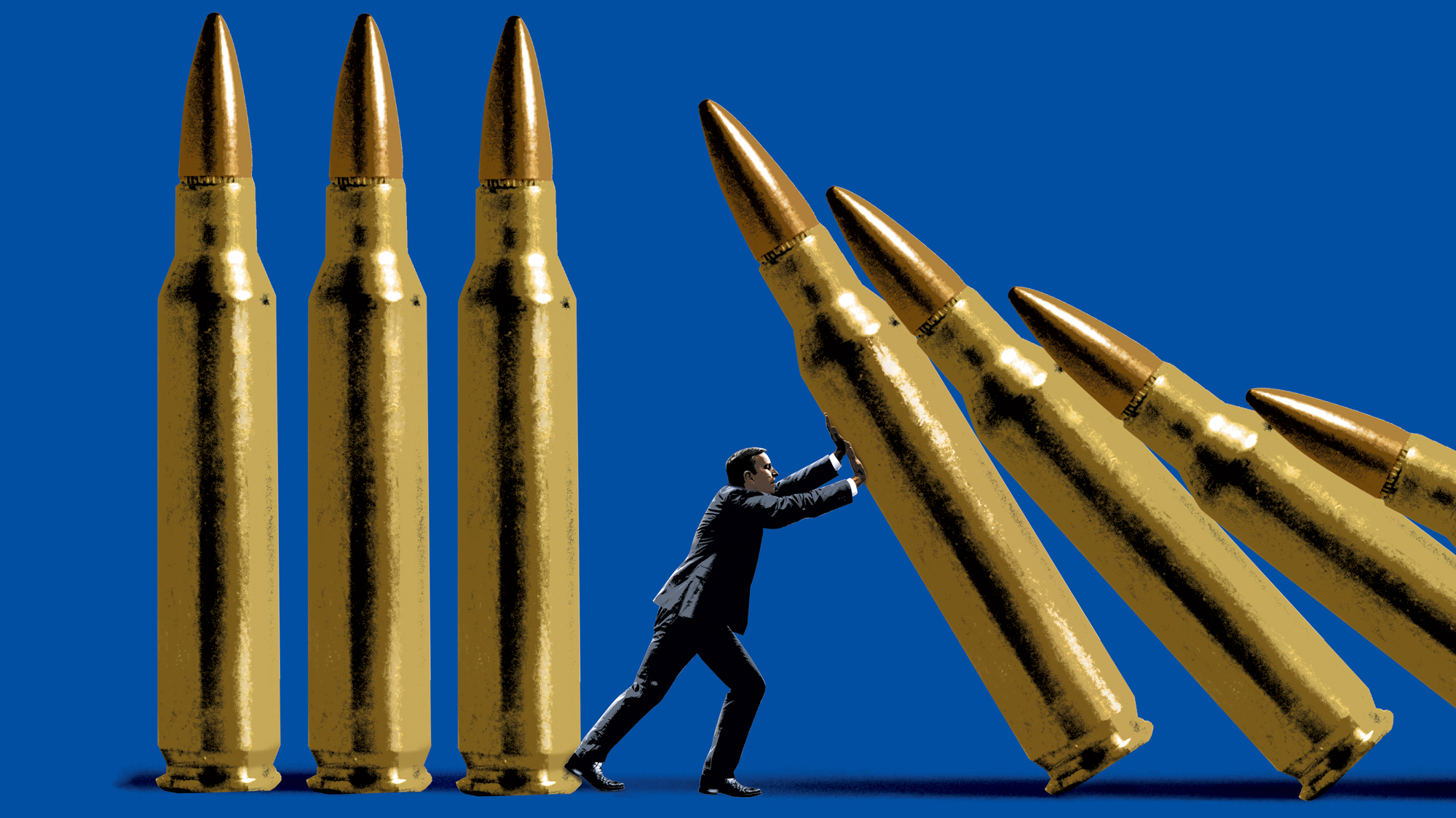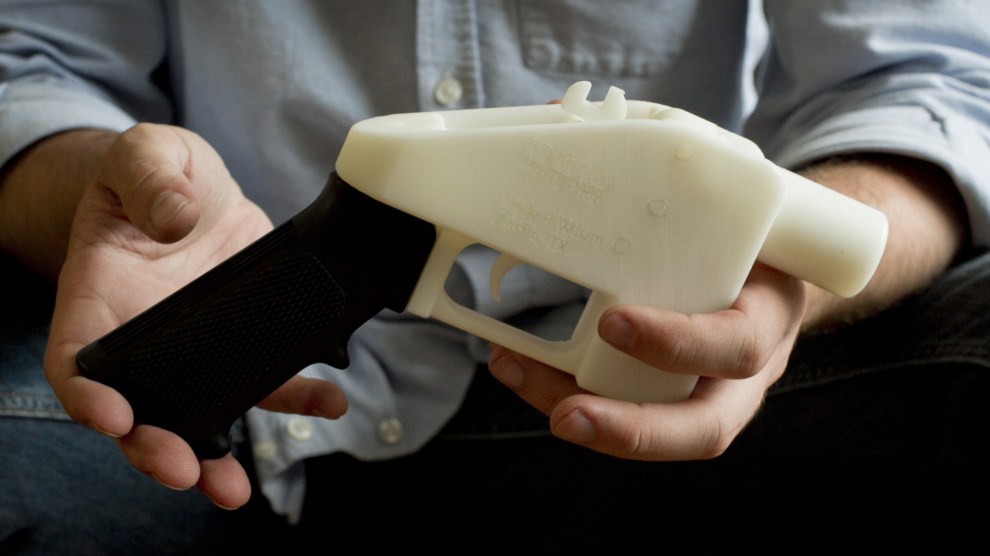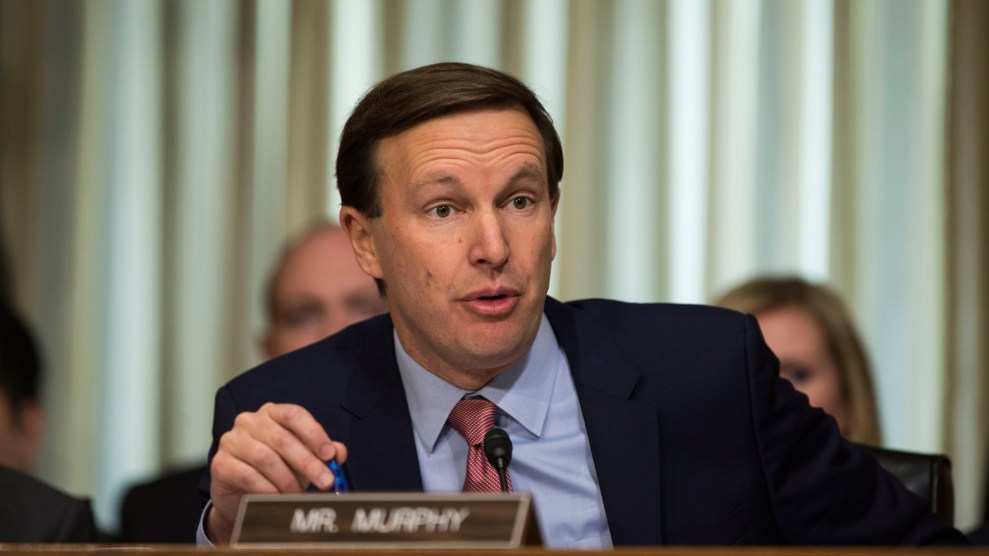On Wednesday, February 14, as the US Senate entered a third day of deadlocked immigration talks, Sen. Chris Murphy arrived at the Capitol to call for protections for undocumented migrants brought to the country as children. “Immigrants have always fueled America’s economy,” he tweeted. “Dropping a history lesson on the Senate floor at 3pm.”
But moments before he approached the lectern, Murphy learned that a gunman had opened fire at a high school in Parkland, Florida. The history lesson would have to wait. “As we speak, there is a horrific scene playing out at a high school in South Florida,” he said gravely as he addressed his colleagues in the Senate chamber. “Turn on your television right now. You’re gonna see scenes of children running for their lives.”
Murphy’s jaw jutted out in anger. “We are responsible for a level of mass atrocity that happens in this country with zero parallel anywhere else,” he said, his voice rising. “As a parent, it scares me to death”—he jabbed his finger into the air with each word for emphasis—“that this body doesn’t take seriously the safety of my children.”
In the six years since the Sandy Hook Elementary School massacre shook his district and left 26 dead, the Connecticut Democrat has become the most outspoken gun control advocate in Congress. He’s made dozens of floor speeches on the subject, most memorably a 15-hour filibuster after the 2016 Orlando nightclub shooting that killed 49 people.
For years, his pleas have been met almost entirely with inaction, even as some polls show that up to 97 percent of Americans support expanded background checks. Republicans, unwilling to risk the wrath of the National Rifle Association, have largely refused to back any real gun safety measures. Democrats have also shied away from the issue. But after Parkland, something new began. The Marjory Stoneman Douglas survivors weren’t shy about blaming Congress for the slaughter of their friends. And as gun control groups found themselves inundated with thousands of new volunteers and millions of dollars in unsolicited donations, it became clear that much of the nation agreed.
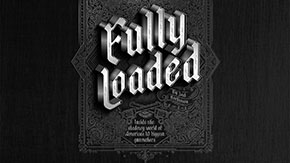
RELATED: Fully Loaded, Inside the Shadowy World of America’s 10 Biggest Gunmakers
Murphy—up for reelection this year and viewed as a potential White House contender—has long toiled to make gun control a viable issue on Capitol Hill. When his efforts to court bipartisan support for background checks failed after Sandy Hook, he took a different tack, deciding it would be easier to replace his opponents than to convert them—a stance that failed to capture popular support until the #NeverAgain teens came along. I met with Murphy a few times over the summer and spoke with more than 30 activists, political operatives, and congressional colleagues. It became clear that he has thrown himself into the project of turning the “Parkland effect” into a winning issue for Democrats, with a goal of flooding Capitol Hill with gun control champions and forcing Republicans to reassess their subservience to the NRA. In short, he’s trying to build a Congress that will finally do something about guns.
For decades, gun control has been viewed as a third rail for Democrats. After they championed a bipartisan federal assault weapons ban back in 1994, President Bill Clinton attributed the GOP’s recapture of Congress for the first time in 40 years in part to his party’s sympathies for firearm restrictions. When Al Gore lost the 2000 presidential election, pundits faulted his talk of gun control for his defeat. Democratic presidential candidate Howard Dean repeated that refrain in 2004, ascribing the loss of Southern and Western votes to talk of “guns, God, and gays.” And in 2006, when Democrats retook Congress with freshmen representatives, they did so partly by recruiting NRA-backed candidates and Democrats who didn’t discuss gun control.
Murphy was one of the latter. He defeated Nancy Johnson, a 12-term GOP incumbent in Connecticut’s 5th Congressional District, by speaking against the Iraq War, not firearms. When he ran for Senate and won in 2012—a year in which the NRA backed nearly 30 Democrats at the federal level—his campaign website stated no position on guns.
That all changed on December 14, 2012. Murphy, waiting in Bridgeport for a train to take his family to see the Rockefeller Center Christmas tree, was alerted to the ghastly news from Newtown. He rushed to wait with fearful parents at the Sandy Hook Volunteer Fire & Rescue station until Gov. Dannel Malloy told them that anyone still unaccounted for was dead. It was gutting to be with them, Murphy told CNN on the five-year anniversary of the massacre: “They’re my age. Their kids are my kids’ ages.”
“It was earth-shattering, a time capsule moment from before and after,” recalls one staffer who at the time had been helping Murphy transition to the Senate. “He hadn’t even gotten to his new office yet,” says Christian Heyne, a lobbyist for the Coalition to Stop Gun Violence, who met with Murphy’s staff in a dank basement room in a Senate office building. “He leaned into it, he had a lot of questions. He read every book that he could, and he was bringing the right people to the table.”
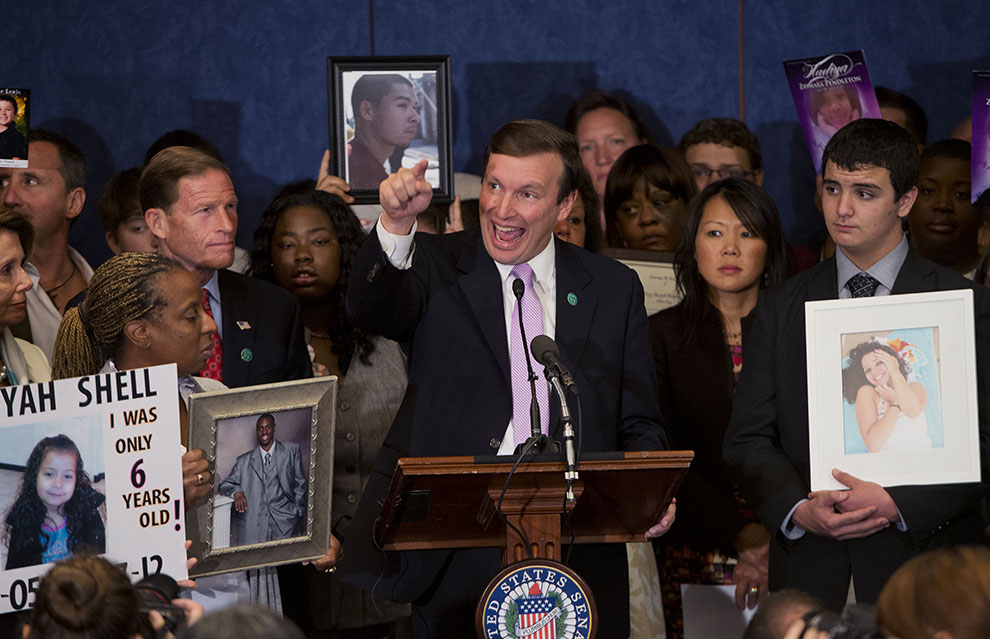
Sen. Chris Murphy, D-Conn., speaks during an event in the Capitol Visitor Center to call on Congress to act on gun control legislation. Victims of the Sandy Hook Elementary shooting and other gun violence victims are also on hand.
Tom Williams/CQ Roll Call/AP
The “right people” were a newly mobilized assortment of activists and politicians. Gabby Giffords—one of the 2006 gun-shy Democratic House freshmen who resigned after being seriously wounded in a Tucson, Arizona, mass shooting—consulted with Murphy as she and her husband launched a new gun safety group. Joe Manchin, the moderate Democratic senator from West Virginia, teamed up with Pennsylvania Republican Pat Toomey to try to expand background checks. On Valentine’s Day in 2013, Shannon Watts, a mother of five who on the day after Sandy Hook founded Moms Demand Action for Gun Sense in America, brought her budding army to Capitol Hill to lobby for the Manchin-Toomey bill. (When they got to Murphy’s office, his staff gave them handmade valentines.) Meanwhile, Murphy and his Connecticut colleagues worked with the Sandy Hook families to gather support for the legislation.
But after a last-minute NRA lobbying effort killed the bill, the nascent partnership lost its footing. The new national groups turned their attention to state legislatures, where they hoped gun control might be an easier sell. “Congress would be the finale, not the curtain raiser,” says John Feinblatt, the president of Everytown for Gun Safety, the organization backed by former New York City Mayor Michael Bloomberg.
Manchin-Toomey’s failure to pass stunned Murphy. “Cowardice on the Senate floor today,” the senator tweeted after the vote. And over the next few years, he publicly excoriated his colleagues when mass shootings in San Bernardino, Charleston, and the nation’s capital were met with no congressional action. After the 2016 Orlando nightclub shooting, Murphy lost his patience. “I can’t tell you how hard it is to look into the eyes of the families of those little boys and girls who were killed in Sandy Hook and tell them that almost four years later, we have done nothing. Nothing at all,” he said as he took the Senate floor. “I am at my wit’s end.”
Thus began Murphy’s viral filibuster, during which he and other Democrats held up pictures of the Newtown and Orlando victims. He drew the ire of the NRA, which claimed he’d gotten certain facts wrong, and the admiration of Hillary Clinton, who gave him a prime-time spot at the Democratic National Convention that summer. He held the floor for nearly 15 hours in an audacious display that upset Senate norms and astonished his colleagues. The Senate’s history is rife with filibusters that have stood in the way of a vote, but Murphy’s performance was one of the few conducted to force one—on the evergreen demand to expand background checks, and to ban gun sales to suspected terrorists. When a vote seemed likely, Murphy concluded his marathon speech with the heartbreaking recollection of Anne Marie Murphy, a classroom aide who died at Sandy Hook trying to shield six-year-old Dylan Hockley from the gunman. “It doesn’t take courage to stand here on the floor of the United States Senate for two hours or six hours or 14 hours,” Murphy said. “It takes courage to look into the eye of a shooter and instead of running, wrapping your arms around a six-year-old boy and accepting death.” The Senate voted down both issues.
After that, Murphy became the de facto captain of the movement on Capitol Hill. “The biggest reason Chris emerged as the leader is because he took a risk,” says Peter Ambler, a former Giffords congressional aide who now runs her gun control group. “Here is this incredibly young, fresh, dynamic, committed person saying, ‘Screw it. We’re not doing what we need to do. And I’m not going to play by the rules because people are dying.’”
The filibuster solidified Murphy’s leadership and strategy. Instead of caving to criticism for politicizing tragedies, Shannon Watts says, “our feeling was: Really, the best time to talk about a shooting was right after it happened.” Murphy was a good person to have on point. “He’s always been marvelously articulate,” says George Jepsen, the outgoing Connecticut attorney general who gave Murphy one of his first jobs in politics after college. “He can assimilate large amounts of information and talk knowledgeably about complex issues that make them accessible to the average voter.” Activists say they count on his office to frame their work in a way that satisfies both the movement and congressional colleagues. “There are a lot of different players in the movement,” says Kris Brown, co-president of the Brady Campaign to Prevent Gun Violence. “They’ve been really helpful in trying to focus strategically.”

RELATED: Six Months Later, Parkland Teens Are Still Fighting Like Hell
When Fred Guttenberg, who lost his daughter Jaime in the Parkland shooting, ran into Murphy in a Senate building, the senator “asked me who I’d been meeting with,” Guttenberg says. Guttenberg had been having an easier time gaining traction with Democrats like Florida Sen. Bill Nelson and Rep. Ted Deutch than with Republicans like Sen. Marco Rubio. “He nicely and gently said, ‘Be careful,’” Guttenberg recalls. Attempts to change Republican minds, Murphy told him, might leave Guttenberg disappointed. “He was trying to say to me, ‘People are who they are. Don’t lose too much sleep over trying to redirect them the way you want them to go. There are plenty of people in this town who support you. Go and build from there.’”
Murphy had also mastered social media to challenge the status quo on the politics of guns. “Guns drove Democratic and Republican turnout EQUALLY, contrary to the conventional wisdom that guns are a driver of Republican turnout only,” he tweeted the day after Democrat Ralph Northam—who campaigned on requiring universal background checks and limiting handgun purchases—won the 2017 Virginia gubernatorial race.
But if Murphy was aggressive on social media, the Parkland survivors have been ferocious. “@realDonaldTrump you’re a hypocrite that is owned by the NRA please prove me wrong,” David Hogg, a Stoneman Douglas senior, tweeted weeks after the shooting. The nation watched as the teens turned their grief into passionate organizing. Their rallying cries to “vote them out” aligned with the conclusion Murphy reached after Manchin-Toomey failed: Ambitious gun control aims had little chance in a Congress under the sway of the NRA. For the Parkland activists, that meant it was time for voter registration and education efforts. For Murphy, it meant more Democrats were needed in office.
Less than two weeks after Parkland, Murphy convened Democratic lawmakers and major gun safety groups to catalyze change. The conversation took place at the Democratic Senatorial Campaign Committee headquarters and included Murphy’s Connecticut colleague, Sen. Richard Blumenthal, as well as California Sens. Kamala Harris and Dianne Feinstein and Maryland Sen. Chris Van Hollen, who as head of the DSCC was in charge of electing Democrats to the Senate. A number of House members also participated, including Rep. Deutch of Florida, a new member of what Murphy calls the “macabre club” of lawmakers whose constituents have experienced mass shootings. Representatives from Brady, Everytown, the Coalition to Stop Gun Violence, and Giffords’ group, which approach the issue from different angles, attended, too.
Murphy and his colleagues wanted the gun groups to follow the Parkland teens’ lead by prioritizing the midterms and not spending their newly acquired millions on state ballot initiatives, as they’d done in the 2016 cycle. “We’ve got to narrow our focus to a half a dozen or a dozen races where we think the issue of background checks can be a decisive issue,” Murphy explained later, “which means Bloomberg and Giffords and Brady working together as much as possible.”
That hasn’t entirely happened. Both Giffords and Everytown aim to flip the House, but they’ve also thrown support behind several Republicans with gun control records that are mixed at best. Two years ago, Giffords backed Toomey in his tight reelection battle, a reward for his work on the ill-fated background-check bill after Sandy Hook.
Murphy may also dream of turning gun control into a bipartisan issue, but he has a different idea of how to do it. Where Giffords and Everytown offer carrots to inspire Republicans to sign on to modest gun control measures, Murphy prefers the stick. “If Republicans get wiped out in 2018, guns has gotta be part of their postmortem,” he says. “If they get wiped, they will look at the swing districts they lost and see their fealty to the NRA as a major liability. My hope is that in 2019, a handful of Republicans say to themselves, ‘If we want to survive 2020, we have to get rid of a couple of our big issue liabilities.’” So far, most Republicans are sticking to their guns, and the NRA has spent more than $2 million on the midterms to make sure they do. But Democrats seem to be getting another message—just three have received financial backing from the NRA, an almost 90 percent decline from six years ago. And for the first time since 2012, pro-gun-control election ads outnumber ads touting gun rights, according to a USA Today analysis.
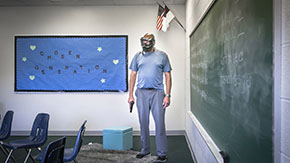
Murphy has been most encouraged by the sustained energy of the #NeverAgain teens, who spent their summer rallying massive crowds in dozens of cities on their “Road to Change” tour, generating the fanfare necessary to maintain the national media’s attention. The finale was in Newtown in early August, where, under an unrelenting drizzle, hundreds gathered to rally for gun safety and register voters. Murphy sneaked backstage to offer hugs, take selfies, and reassure the young activists about their speeches.
I asked Murphy what it was like to watch an event of this scale unfold in the town where so many people had for so long sought federal action to protect other families from the grief they had endured. “This is actually pretty amazing,” he told me, beaming as he surveyed the crowd, some of whom were wearing orange, the color of the gun violence prevention movement. “There’s nothing like watching our movement get stronger than the gun lobby in real time. This couldn’t have existed two years ago. It certainly couldn’t have existed six years ago. It’s pretty wild.”
